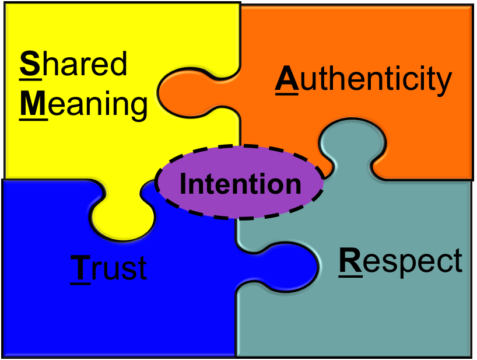
When we enter into a “difficult” conversation with family, friends, and colleagues, most of us understand what we should do. Listen carefully, show respect, speak diplomatically, etc.
Just about all of us, though, fall considerably short of these standards, even when we enter into a conversation with the best of intentions. We may have a vague sense of how things went off the rails, but we’re not entirely certain of how we could have avoided the unhappy outcome.
Maria Latimore led a workshop on SMART Conversations® at a recent meeting of the Nonprofit Consultants Network to help answer that question. One of Maria’s first points was that when triggered, all of us, to varying degrees, can approach tricky conversations by either “avoiding” or “attacking.” To move towards the middle of the spectrum, where Smart Conversations® happen, we have to strive to meet four conditions:
Shared Meaning, Authenticity, Respect and Trust = SMART
Of the many ideas Maria shared, several stood out for me.
If organizations don’t create a work environment with psychological safety, they likely are sacrificing productivity. Everyone must feel comfortable sharing their ideas. If team members feel that speaking up is risky, it’s harder to achieve progress. When we shut off the flow of thoughts and feelings, our colleagues don’t share ideas and innovation doesn’t happen.
My own hunch is that the majority of conversations likely run amok because a connection between the participants hasn’t happened before they discuss content. This is when it’s important to establish “shared meaning.”
Shared meaning can be pausing in the middle of a difficult conversation (or in advance of one) and acknowledging together: “All of us want what’s best for the team, and our collective goal is to accomplish x, y and z. So let’s try not to allow our personal motivations to interfere with that.” Or shared meaning can be more practically expressed as “I thought we were meeting to talk about x, but it sounds like you’re talking about y. Which topic should we focus on?” To achieve shared meaning, participants must demonstrate respect, authenticity and trust towards one another.
Taking words directly from Maria’s presentation:
This is a principle that all of us understand, but we struggle with mightily. Here, we must recognize how we tend to handle difficult conversations – are we avoiders or attackers? – and we have to acknowledge our tendencies and take measures to move toward SMART. To achieve this, of course, we have to be honest with ourselves by knowing our authentic selves.
A co-created relationship between two people relies on both individuals being sensitive to the impact of their words, particularly when their intended meaning might not align with how the other person perceives those words. Maria gave a previous workshop in which a participant shared the following idea, which sums it up well: “I am the expert of my intent, and you are the expert of my impact.”
Though I don’t expect to be a SMART Conversation® master anytime in the near future, I do think that 1) being aware of the SMART acronym; 2) thinking about what my intent is when I say things; and 3) being honest with myself during a conversation will all improve the outcomes of my communication with others.